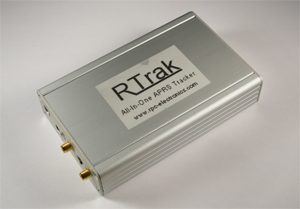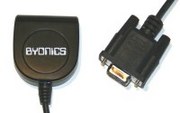I’ve intended to do some comparisons between the APRS Tracker (Automatic Position Reporting System) options out there to decide which one I might purchase and use. APRS combines GPS receivers with ham radio transmitters to allow the user to broadcast their current speed, position, and altitude via radio. Other users receive those location packets and place them on the internet for easy mapping and data collection.
My primary uses would be for tracking my car and aircraft, as well as possible use for hiking, mountain bike riding, etc. Some day down the road it might be integrated in to high altitude balloons or radio controlled aircraft, etc.
So for most all of those applications, small size, light weight, low power consumption, and a simple package are the preferences. Currently I use a Kenwood TH-D7 with a Garmin GPS III+ when I need to do APRS. That ends up being a mess of wires by the time I’m done… so I’m hoping for something simpler, and preferably with a dedicated frequency agile 2M radio.

The device that got me started on this search was seeing the recent release of the RPC Electronics RTrack tracker. Small size, good looking package, built in radio, programmable to have different profiles, smart beaconing, etc. This unit includes the 500mW Frequency Agile 2M transmitter, APRS Modem, and GPS, all for a price of $250 plus shipping.

Next would be the Byonics MicroTrak devices. They have versions from 300 mW up to 10 Watts. Nice to have some options there! For aircraft use, I think the 300 mW would be just fine, but even with my TH-D7 putting out 5W, I know my APRS coverage in the car is pretty poor in my area, even with an external antenna. So maybe I should go with a higher power unit. Once of the nice things is you can add an amplifier to their lower power versions if you change your mind later. The costs for these vary between $105-$180 for the pre-built versions.

And with all of those, you’d need to add a GPS to the package such as the Byonics GPS1 or Byonics GPS2 for $56 or $69 respectively. So this places the least expensive operational unit at $161, and the range of units from $161-249.
For all of the units I’m initially comparing, I’m not yet looking at if they need antennas, extra power supplies or voltage regulators, batteries, etc. The MicroTrak does offer as an option a voltage regulator, the Micro-Volt 12 that will run from 12-24 volts, so that would be great for car and aircraft use.
I’m going to re-visit this post as I look further in to things, so check back here for updates. But at first glance… I like the simplicity and “sealed package” of the RTrack, everything is in the box. But if I built a box for the Byonics system, for approximately the same price I could have the option of 10 Watts. So it looks like I need to look further in to the differences between the TinyTrak3 features and the OpenTracker 1+ software and options. If I built a box for the Byonics I could include room for batteries.
Update 12/5/08
As I was checking out self contained trackers again recently I spotted a new option on the market. It is the Byonics Micro-Track AIO (All In One). It offers a transmit power of up to 10 watts, a built in GPS, and room for AA batteries right inside the box. This means you get more transmit power, and no need for external batteries. Looks like a nice option and I’ll keep my eye on it in the future.

